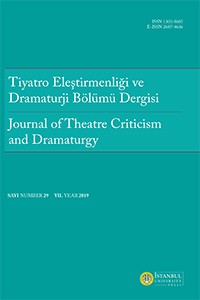Chambord Şatosu’ndan Osmanlı Sahnelerine Taşınan Şamata: Yirmi Çocuklu Bir Adam yahut Fettan Zaman İnsana Neler Yapmaz
Öz
“Çeviriler Çağı” (1869-1882), Osmanlı tiyatro adamlarının, Türkçe tiyatro yapan kumpanyaları, özellikle de Güllü Agop’un “Osmanlı Tiyatrosu”nu farklı metin üretme tekniklerini kullanarak yarattıkları yeni oyunlarla besledikleri bir dönem olmuştur. Çevirmenler, artık klasikleşen ya da o dönem revaçta olan yeni Fransız oyunlarını Türkçeye çevirerek, uyarlayarak, Türkçede yeniden yazarak yeni bir tiyatro repertuvarı oluşturmuşlardır. Mehmet Hilmi’nin Molière’in Monsieur de Pourceaugnac’ından yaptığı Yirmi Çocuklu Bir Adam yahut Fettan Zaman İnsana Neler Yapmaz başlıklı çevirisi de bu repertuvarın sahnede çok tutmuş başarılı örneklerindendir. Bu makalede çevirmen Mehmet Hilmi’nin kaynak metni Osmanlı seyircinin beğenisine uygun hale getirmek için ne tür bir kültürel ve estetik dönüşümden geçirdiği incelenecektir.
Anahtar Kelimeler
Kaynakça
- Ahmed Rasim. Muharrir Bu Ya. haz. Hikmet Dizdaroğlu. Ankara: MEB Yayınları, 1969.
- And, Metin. Karagöz : Théâtre d’ombres turc. Ankara: Dost Yayınları, 1977.
- And, Metin. Kavuklu Hamdi’den Üç Orta Oyunu. Ankara: Forum Yayınları, 1962.
- And, Metin. Osmanlı Tiyatrosu. Ankara: Dost Yayınları, 1999.
- And, Metin. Tanzimat ve İstibdat Döneminde Türk Tiyatrosu (1839-1908). Ankara: Türkiye İş Bankası Kültür Yayınları, 1972.
- And, Metin. « Türkiye’de Molière », Tiyatro Araştırmaları Dergisi Molière Özel Sayısı 5 (1974), 49-64.
- De Nerval, Gérard. Œuvres complètes de Gérard de Nerval III: Voyage en Orient II. Paris: Michel-Lévy frères, 1867.
- Galland, Antoine. Journal d’Antoine Galland pendant son séjour à Constantinople (1672-1673) c. 2. haz. Charles Schefer. Paris: Ernest Leroux, 1881.
- Guidère, Mathieu. Introduction à la traductologie. Penser la traduction : hier, aujourd’hui, demain. Bruxelles: De Boeck, 2012.
- Kudret, Cevdet. Karagöz c. 2. Ankara: Bilgi Yayınevi, 1969.
- Louvat-Molozay, Bénédicte; Bourqui, Claude; Piéjus, Anne. Molière’in « Monsieur de Pourceaugnac » oyunu için tanıtım, Œuvres complètes II. haz. Georges Forestier ve Claude Bourqui. 1409-1423. Paris: Éditions Gallimard, 2010.
- Mehmet Hilmi. Yirmi Çocuklu Bir Adam yahut Fettan Zaman İnsana Neler Yapmaz. İstanbul: Mekteb-i Sanayi-i Şahane Matbaası, 1297/1880.
- Molière. Œuvres complètes II. haz. Georges Forestier ve Claude Bourqui. Paris: Éditions Gallimard, 2010.
- Özön, Mustafa Nihat; Dürder, Baha. Türk Tiyatrosu Ansiklopedisi. İstanbul: Remzi Kitabevi, 1967.
- Pekman, Yavuz. Çağdaş Tiyatromuzda Geleneksellik. İstanbul: Mitos-Boyut Yayınları, 2002.
- Şener, Sevda. « Molière ve Türk Komedyası », Tiyatro Araştırmaları Dergisi Molière Özel Sayısı 5 (1974), 25-30.
- Türkmen, Nihal. Orta Oyunu. İstanbul: MEB Yayınları, 1971. Yon, Jean-Claude. Le Théâtre français à l’étranger au XIXe siècle. Histoire d’une suprématie culturelle. Paris: Nouveau Monde, 2008.
The Commotion of the Chambord Chateau Brought to the Ottoman Stage: Yi̇rmi̇ Çocuklu Bi̇r Adam yahut Fettan Zaman İnsana Neler Yapmaz
Öz
The “Age of Translations” (1869-1882) was a period in which the men of Ottoman theater provided theater companies with plays to be performed in Turkish, especially at Güllü Agop’s “Osmanlı Tiyatrosu” (“Ottoman Theater”), and these new plays were written using different techniques of text production. By translating and adapting new French plays that were either considered classics or were popular at the time into Turkish, or by rewriting them in Turkish, they created an entirely new repertoire for the theater. Mehmet Hilmi’s Yirmi Çocuklu Bir Adam yahut Fettan Zaman İnsana Neler Yapmaz (The Man with 20 Children or What can't Cunning Time do to People), an adaptation of Molière’s Monsieur de Pourceaugnac, is one of the more successful examples of this. This article will examine exactly how Mehmet Hilmi transformed the source text to make it compatible, both in terms of culture and aesthetics, to the Ottoman audiences for which these plays would be performed.
Anahtar Kelimeler
Molière comedy translation adaptation Ottoman popular theater
Kaynakça
- Ahmed Rasim. Muharrir Bu Ya. haz. Hikmet Dizdaroğlu. Ankara: MEB Yayınları, 1969.
- And, Metin. Karagöz : Théâtre d’ombres turc. Ankara: Dost Yayınları, 1977.
- And, Metin. Kavuklu Hamdi’den Üç Orta Oyunu. Ankara: Forum Yayınları, 1962.
- And, Metin. Osmanlı Tiyatrosu. Ankara: Dost Yayınları, 1999.
- And, Metin. Tanzimat ve İstibdat Döneminde Türk Tiyatrosu (1839-1908). Ankara: Türkiye İş Bankası Kültür Yayınları, 1972.
- And, Metin. « Türkiye’de Molière », Tiyatro Araştırmaları Dergisi Molière Özel Sayısı 5 (1974), 49-64.
- De Nerval, Gérard. Œuvres complètes de Gérard de Nerval III: Voyage en Orient II. Paris: Michel-Lévy frères, 1867.
- Galland, Antoine. Journal d’Antoine Galland pendant son séjour à Constantinople (1672-1673) c. 2. haz. Charles Schefer. Paris: Ernest Leroux, 1881.
- Guidère, Mathieu. Introduction à la traductologie. Penser la traduction : hier, aujourd’hui, demain. Bruxelles: De Boeck, 2012.
- Kudret, Cevdet. Karagöz c. 2. Ankara: Bilgi Yayınevi, 1969.
- Louvat-Molozay, Bénédicte; Bourqui, Claude; Piéjus, Anne. Molière’in « Monsieur de Pourceaugnac » oyunu için tanıtım, Œuvres complètes II. haz. Georges Forestier ve Claude Bourqui. 1409-1423. Paris: Éditions Gallimard, 2010.
- Mehmet Hilmi. Yirmi Çocuklu Bir Adam yahut Fettan Zaman İnsana Neler Yapmaz. İstanbul: Mekteb-i Sanayi-i Şahane Matbaası, 1297/1880.
- Molière. Œuvres complètes II. haz. Georges Forestier ve Claude Bourqui. Paris: Éditions Gallimard, 2010.
- Özön, Mustafa Nihat; Dürder, Baha. Türk Tiyatrosu Ansiklopedisi. İstanbul: Remzi Kitabevi, 1967.
- Pekman, Yavuz. Çağdaş Tiyatromuzda Geleneksellik. İstanbul: Mitos-Boyut Yayınları, 2002.
- Şener, Sevda. « Molière ve Türk Komedyası », Tiyatro Araştırmaları Dergisi Molière Özel Sayısı 5 (1974), 25-30.
- Türkmen, Nihal. Orta Oyunu. İstanbul: MEB Yayınları, 1971. Yon, Jean-Claude. Le Théâtre français à l’étranger au XIXe siècle. Histoire d’une suprématie culturelle. Paris: Nouveau Monde, 2008.
Ayrıntılar
| Birincil Dil | Türkçe |
|---|---|
| Konular | Uygulamalı Tiyatro |
| Bölüm | Araştırma Makalesi |
| Yazarlar | |
| Yayımlanma Tarihi | 27 Aralık 2019 |
| Yayımlandığı Sayı | Yıl 2019 Sayı: 29 |

